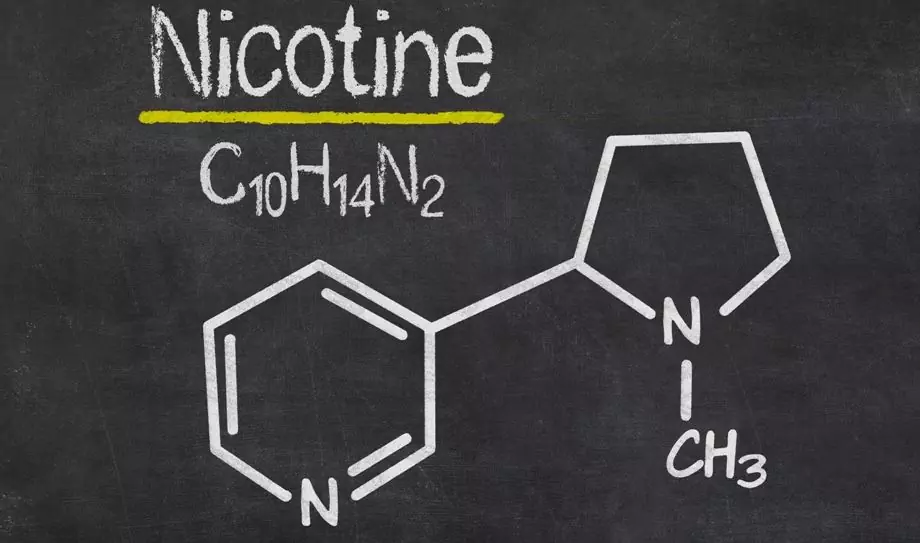- Author Rachel Wainwright wainwright@abchealthonline.com.
- Public 2023-12-15 07:39.
- Last modified 2025-11-02 20:14.
Nicotine
Nicotine is an alkaloid synthesized in the roots of Solanaceae plants and accumulates in the leaves. Nicotine is found mainly in tobacco and makhorka, but it is also present in small doses in eggplant, green peppers, potatoes and tomatoes, as well as in coca leaves. Nicotine is a potent neuro- and cardiotoxin. With the constant ingress of this substance into the body, a person develops a strong but treatable addiction. The effect of nicotine on the body leads to the development of a number of serious diseases.

How nicotine works
When it enters the body, nicotine quickly spreads through the bloodstream to all organs. 7 seconds is enough for nicotine to enter the brain. Nicotine can cross the blood-brain barrier (physiological protection of the central nervous system from microorganisms circulating in the blood). The dose of nicotine that enters the body with each cigarette smoked is significantly less than the amount of nicotine contained in the smoke. When smoking, the amount of nicotine entering the body is much lower than when using snuff and chewing tobacco.
Nicotine, entering the body, acts on nicotinic acetylcholine receptors, increasing their activity, which leads to increased production of epinephrine, as well as the release of adrenaline and norepinephrine into the blood, which in turn changes the emotional background of a person, giving rise to a feeling of excitement, vigor, clarity of mind, burst of energy, psychological relaxation, a feeling of lightness and happiness.
The effect of nicotine on the cardiovascular system is manifested in the form of tachycardia, an increase in blood pressure, vasoconstriction, which leads to a violation of the blood supply to organs. The effect of nicotine on internal organs is due to reflex action. The action of nicotine on receptors also contributes to an increase in the production of dopamine, a neurotransmitter that causes a feeling of pleasure and satisfaction.
Nicotine under the influence of enzymes is oxidized to non-toxic nicotinic acid (vitamin PP), but the human body does not produce the enzymes necessary for oxidation. Therefore, the lack of vitamin PP can be observed even in smokers.
The effect of nicotine on the human body
One cigarette can contain up to 1.27 mg of nicotine, which, when administered intravenously, is a lethal dose for humans. The effect of nicotine changes the functioning of all organ systems. Nicotine develops psychological and physical dependence.
Psychological dependence is a habit that is formed against the background of repeated repetition of an action. Psychological dependence on nicotine is enhanced by a change in the emotional background, which is one of the main factors in the influence of nicotine on the body. A smoker gets used not only to receiving a dose of nicotine that stimulates nervous activity (which is a physical addiction), but also to the ritual itself, which is becoming an integral part of his life.
The negative effect of this substance on the body is manifested in the disruption of the work of its main systems: the central nervous system, cardiovascular and endocrine systems. In addition to the formation of psychological and physical dependence, nicotine contributes to the development of oncological diseases of the respiratory system, coronary heart disease, chronic bronchitis. Smokers exposed to the constant action of nicotine are more prone to the development of thrombosis, atherosclerosis, since nicotine contributes to vasoconstriction.
The effect of nicotine on the body is also manifested in delayed healing of ulcers and chronic mucus hypersecretion. The effect of nicotine contributes to the early development of impotence in men. Women exposed to constant exposure to nicotine have difficulty conceiving and successfully carrying a pregnancy.
Nicotine poisoning: the main signs
Excessive dose of nicotine in the body leads to poisoning. The main symptoms of acute nicotine poisoning are:
- Sudden dizziness, disorientation in space;
- Nausea, increased salivation, vomiting, diarrhea;
- Violation of the rhythm of the heartbeat, increased blood pressure;
- Breathing impairment, hearing impairment, vision;
- Convulsions;
- Respiratory center paralysis (fatal).
Chronic nicotine poisoning is also distinguished, the symptoms of which are:
- Inflammatory processes of the mucous membranes of the oral cavity, larynx, nasopharynx;
- Development of chronic diseases of the respiratory system;
- Increased salivation;
- Decrease in gastric acidity;
- Increased motility of the large intestine.
Found a mistake in the text? Select it and press Ctrl + Enter.






